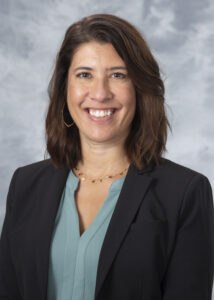 Name: Lisa Imhoff
Name: Lisa Imhoff
Title and Organization: Associate Dean for Diversity, Equity, and Inclusion, University of Wisconsin–Madison School of Pharmacy
Graduation Year and Degree: 2000 Bachelor of Arts in Journalism and Women’s Studies
Earlier this month, Madison365 announced its list of Wisconsin’s Most Influential Asian American Leaders of 2022. This list of outstanding individuals includes J-School alum Lisa Imhoff (BA’00). As the Associate Dean for Diversity, Equity, and Inclusion in UW-Madison’s School of Pharmacy, Lisa works to ensure her organization is thinking critically about their inclusion practices and constantly working to improve. We caught up with her to hear more about her career and what advice she has for J-Schoolers who want to do what she does.
When it comes to this recognition, what are you most proud of?
I am humbled and truly honored by Madison365 picking me among Wisconsin’s other 34 Influential Asian American leaders. I have been following Madison365 and their lists since 2015, so it felt very special when I found out about it.
I’m proud of several things when it comes to this recognition. As a daughter of a Vietnamese refugee, and my own identity as a first-generation college student, I feel proud that my mother instilled in me the importance of education. My father, who was a house painter (and continues to work in his 70s as one!), instilled in me the value of hard work. Without my lived experiences, I don’t think I would have valued education or worked as hard as I have and focused so much of my work on diversity, equity, and inclusion (DEI).
I’m also proud that I have consistently been a person who has pushed organizations to be more innovative and inclusive. I have always found opportunities to make organizations genuinely think about the needs of the most vulnerable, marginalized, historically excluded, etc., and I’ve had excellent colleagues and willing leadership to embrace this work (presently and past). It’s not easy to always point out to others that we can do things better or that the current practices are harmful or exclusive. I do this not to be critical but because I genuinely believe people and organizations can be better and do better. Because I value collaboration, I have been successful in building relationships, and that is honestly how a lot of this work gets accomplished. Overall, DEI work is challenging, so it’s nice to be recognized and for others to say, “I see and value your work,” like in a big way, with the recognition from Madison365, or in smaller ways, like getting emails from colleagues who say, “thank you.”
What advice would you give to a J-Schooler who wants to do what you do?
I’ve been engaging in DEI work for a very long time, and it was in 2019 that I received a formal title. My first piece of advice is to not wait around for a title to do this work.
If you are a current journalism student who is interested in social justice and DEI work, I encourage you to think of ways you can amplify the voices of those who may not be typically represented in media outlets in positive ways and critically think about how journalistic practices can be harmful by either exclusion or by promoting stereotypes about groups and individuals. Look to Madison365 as a media outlet for a positive example. I also see our very own Badger Herald and The Daily Cardinal covering stories about social justice, so it seems like students understand the importance of elevating others’ experiences.
What is your favorite J-School memory?
Growing up in Madison, I always read the local newspapers and watched the local news, so I was ecstatic to have Patricia Sims, a former reporter for the Wisconsin State Journal, and Rick Fetherston, a former newscaster with WMTV NBC 15, as lecturers for two courses I took. Because they were doing the work, I felt I was getting real-world, applicable information. And, they were like celebrities to me, which was cool too!